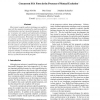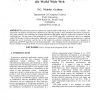47 search results - page 2 / 10 » Tight WCRT analysis of synchronous C programs |
RTSS
2009
IEEE
13 years 11 months ago
2009
IEEE
—Memory accesses form an important source of timing unpredictability. Timing analysis of real-time embedded software thus requires bounding the time for memory accesses. Multipro...
PODC
2009
ACM
14 years 5 months ago
2009
ACM
d Abstract] Christoph Lenzen Computer Engineering and Networks Laboratory (TIK) ETH Zurich, 8092 Zurich, Switzerland lenzen@tik.ee.ethz.ch Thomas Locher Computer Engineering and N...
CODES
2008
IEEE
13 years 6 months ago
2008
IEEE
Synchronous languages like Esterel have been widely adopted for designing reactive systems in safety-critical domains such as avionics. Specifications written in Esterel are based...
ICPP
1998
IEEE
13 years 9 months ago
1998
IEEE
Most current compiler analysis techniques are unable to cope with the semantics introduced by explicit parallel and synchronization constructs in parallel programs. In this paper ...
INTERACT
1997
13 years 6 months ago
1997
Synchronous groupware applications support people collaborating in real time over a distance. The world wide web supports asynchronous collaboration by allowing people to share dis...


